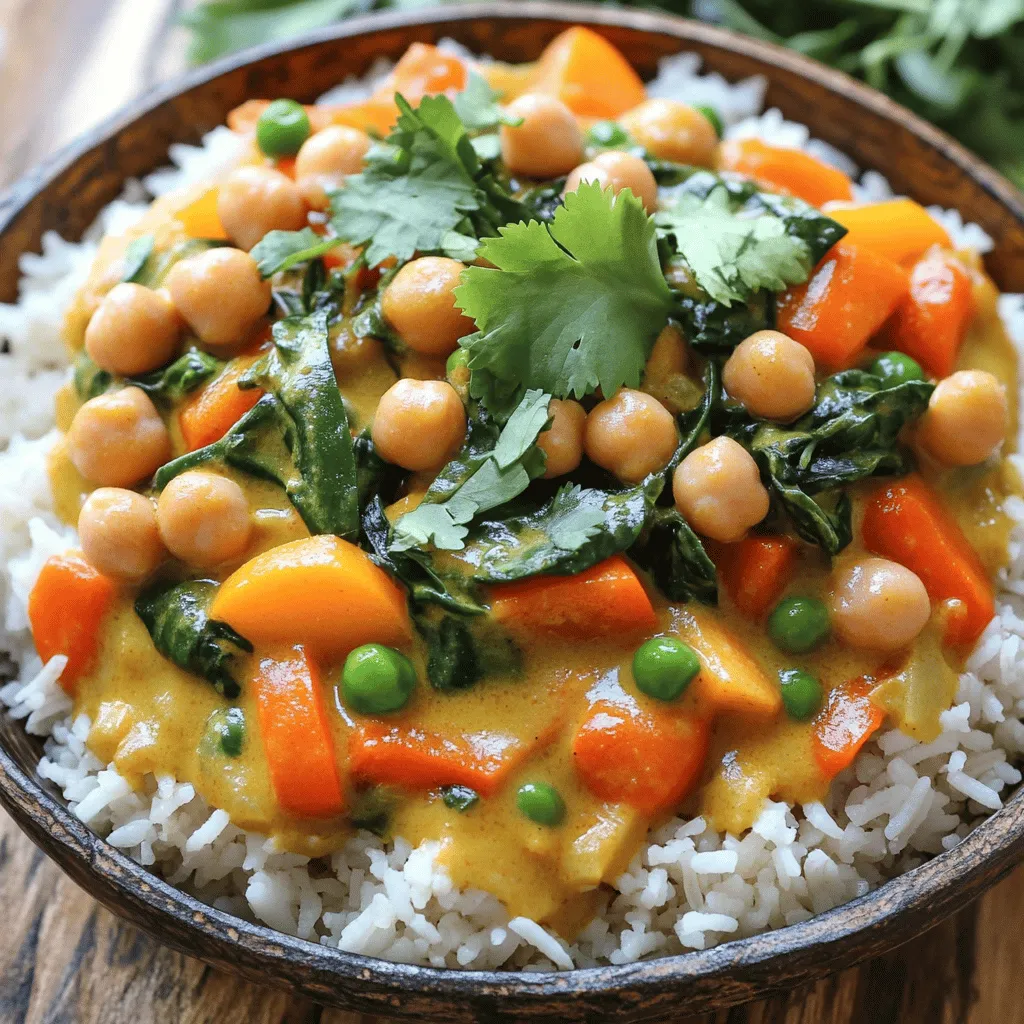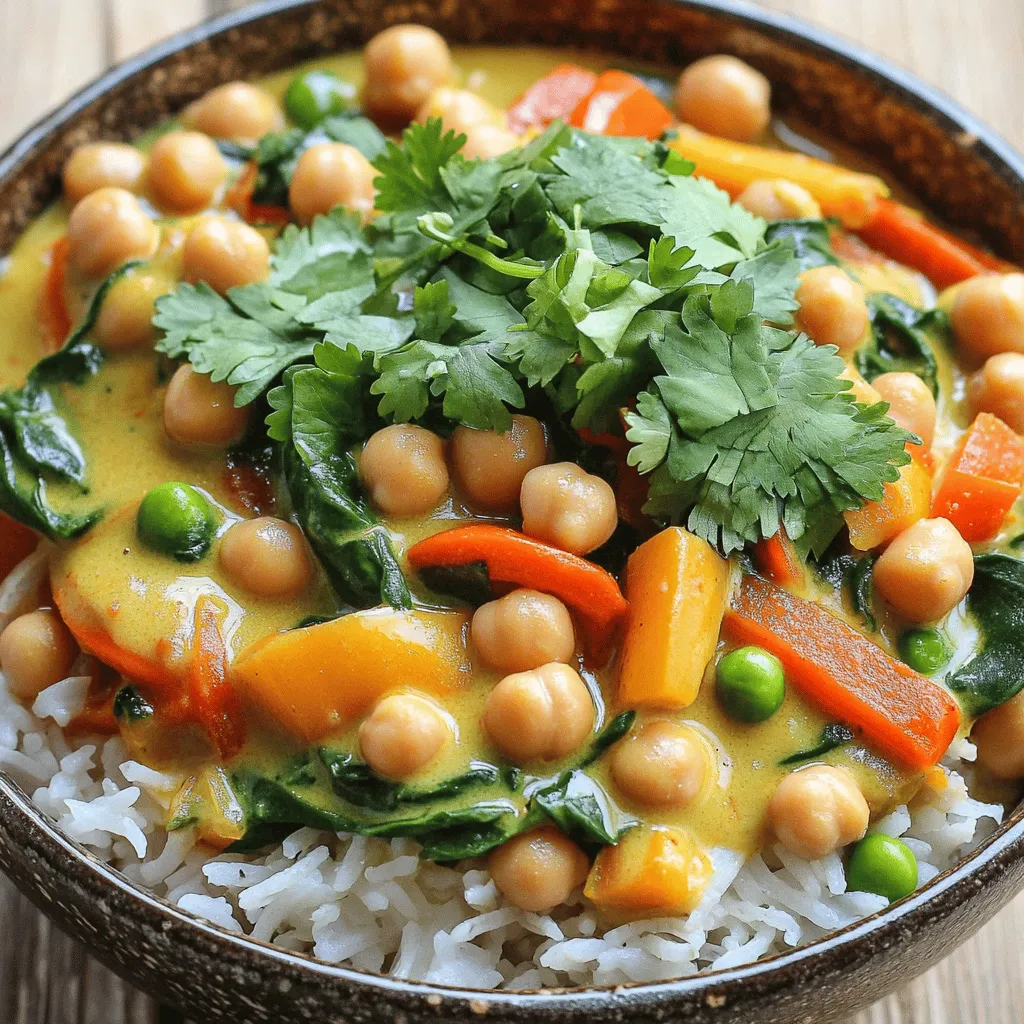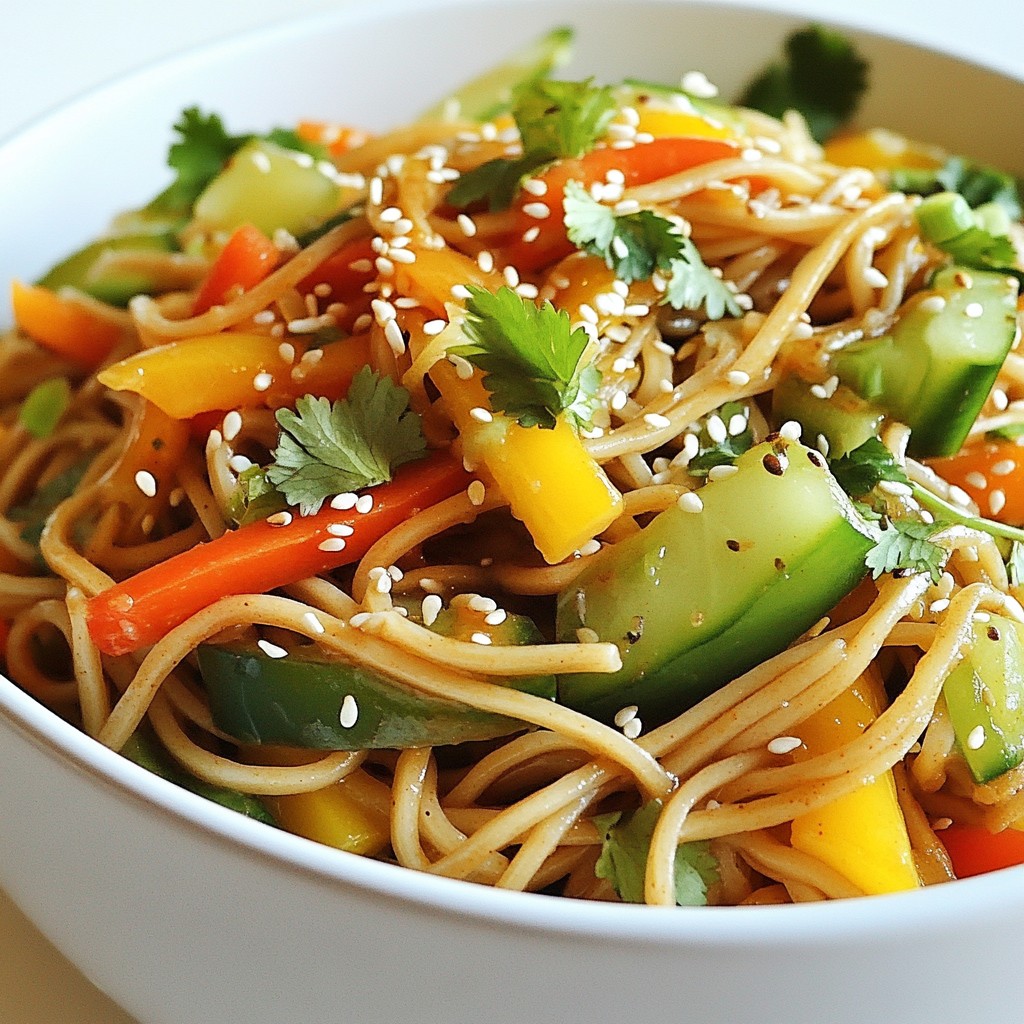If you crave a dish that’s both tasty and simple, you’re in the right place. My Easy Vegetable Curry is packed with vibrant flavors and healthy ingredients. This recipe is perfect for busy weeknights or cozy weekends. You’ll learn essential tips, creative variations, and how to store leftovers. Get ready to whip up a warm bowl of goodness that everyone will love—let’s dive into the recipe!
Ingredients
Essential Ingredients for Easy Vegetable Curry
To make a tasty vegetable curry, you need some key items. Here is the list:
– 1 tablespoon coconut oil
– 1 onion, diced
– 3 cloves garlic, minced
– 1 tablespoon fresh ginger, grated
– 1 tablespoon curry powder
– 1 teaspoon turmeric
– 1 teaspoon cumin
– 1 can (14 oz) coconut milk
– 1 cup vegetable broth
– 2 cups mixed vegetables (carrots, bell peppers, and peas)
– 1 can chickpeas, drained and rinsed
– 1 tablespoon soy sauce
– 2 cups spinach leaves
– Salt and pepper to taste
– Fresh cilantro for garnish
These ingredients work together to create a rich and creamy dish. The coconut milk adds a smooth texture, while spices bring warmth and depth.
Optional Add-ins and Substitutions
You can make this curry your own! Here are some fun options:
– Add diced potatoes for more heartiness.
– Use sweet potatoes for a sweeter taste.
– Swap chickpeas with lentils for a different protein.
– Include any veggies you have, like zucchini or broccoli.
– For a spicy kick, add diced jalapeños or red pepper flakes.
Feel free to experiment and find what you like best.
Recommended Serving Suggestions
Serving your vegetable curry well makes it even more enjoyable. Here are some ideas:
– Serve it over fluffy basmati rice for a filling meal.
– Pair it with warm naan or pita bread to soak up the sauce.
– Add a side salad for some crunch and freshness.
– Top with yogurt or a dairy-free alternative for creaminess.
– Sprinkle fresh cilantro on top for an extra pop of flavor.
These serving suggestions enhance the curry’s taste and make it a feast for the eyes!
Step-by-Step Instructions
Preparation Steps
First, gather all your ingredients. You will need:
– 1 tablespoon coconut oil
– 1 onion, diced
– 3 cloves garlic, minced
– 1 tablespoon fresh ginger, grated
– 1 tablespoon curry powder
– 1 teaspoon turmeric
– 1 teaspoon cumin
– 1 can (14 oz) coconut milk
– 1 cup vegetable broth
– 2 cups mixed vegetables (carrots, bell peppers, and peas)
– 1 can chickpeas, drained and rinsed
– 1 tablespoon soy sauce
– 2 cups spinach leaves
– Salt and pepper to taste
– Fresh cilantro for garnish
Chop the onion, garlic, ginger, and vegetables. This step helps them cook evenly.
Cooking Process Overview
In a large pot, heat the coconut oil over medium heat. Add the diced onion and cook for about 5 minutes. The onion should look clear. Then, stir in the minced garlic and grated ginger. Cook these for about 1-2 minutes until you smell that great aroma.
Next, add the spices: curry powder, turmeric, and cumin. Mix them in for about a minute. Now, pour in the coconut milk and vegetable broth. Bring this mixture to a gentle simmer.
Time to add the mixed vegetables and chickpeas. Cook for 10-15 minutes. The veggies should be tender but still bright. Stir in the soy sauce and spinach, cooking for another 2 minutes. The spinach should wilt nicely.
Final Touches for Serving
Once everything is cooked, taste it. Add salt and pepper if needed. Let the curry sit for a few minutes. This resting time helps the flavors blend.
Serve the curry over fluffy basmati rice. Don’t forget to add fresh cilantro on top for color and taste. And there you have it: a vibrant vegetable curry ready to enjoy!
Tips & Tricks
Best Cooking Practices for Flavor Enhancement
To boost flavor in your vegetable curry, use fresh herbs and spices. Fresh garlic and ginger add a bright taste. Sauté them early to release their oils. Always toast your spices for a minute before adding liquids. This step brings out their rich flavors. Don’t rush the simmering time. Letting it bubble gently helps the ingredients meld together.
Common Mistakes to Avoid
Avoid using too much water when cooking. It can dilute your curry’s flavor. Make sure to chop your vegetables evenly. Uneven sizes cook at different rates. Don’t skip the salt! It enhances all the flavors. Also, remember to taste as you cook. Adjusting flavors throughout the process is key.
How to Adjust Spice Levels
Start with a small amount of curry powder. You can always add more later. If it’s too spicy, stir in a bit of coconut milk. This will cool down the heat. Adding sugar can also balance spice. Don’t forget about the garnish! Fresh cilantro adds a fresh taste and can mellow spices too.

Variations
Adding Protein to Your Curry
To make your vegetable curry heartier, add protein. You can use chickpeas or tofu. Both options give your dish a nice texture. For meat lovers, chicken or shrimp works well too. Cook the protein separately and mix it in. This adds flavor and makes the meal more filling.
Vegetable Alternatives for Different Seasons
Use seasonal vegetables to keep your curry fresh. In spring, try asparagus and green beans. Summer is perfect for zucchini and corn. In fall, pumpkin and squash bring warmth. Winter calls for root veggies like potatoes and turnips. You can mix and match to suit your taste and what’s in season.
Dairy-Free and Vegan Options
Many curries use cream, but you can keep it dairy-free. Coconut milk is a great substitute. It adds creaminess and flavor. For a nutty taste, try almond milk or cashew cream. These options make the dish vegan-friendly. You can enjoy a rich curry without any animal products.
Storage Info
How to Store Leftovers Properly
After enjoying your vibrant vegetable curry, let it cool first. Place the curry in an airtight container. You can store it in the fridge for up to five days. Make sure to label the container with the date. This helps you keep track of how fresh it is.
Reheating Instructions
When you are ready to enjoy the leftovers, you can reheat them easily. Pour the curry into a pot. Heat it on medium-low, stirring often. This helps it warm evenly. You can also use a microwave. Place the curry in a microwave-safe bowl and cover it. Heat in 30-second bursts, stirring in between, until hot.
Freezing Tips for Long-Term Storage
If you want to save your curry for later, freezing is a great option. Let the curry cool completely. Then, transfer it to a freezer-safe container. Leave some space at the top for expansion. You can freeze it for up to three months. When you are ready to eat, thaw it in the fridge overnight. Reheat it as described above. Enjoy your meal any time!
FAQs
How long does it take to make Easy Vegetable Curry?
It takes about 30 minutes to make Easy Vegetable Curry. You spend 10 minutes prepping the ingredients and 20 minutes cooking. This quick time makes it a great choice for busy nights.
Can I use frozen vegetables instead of fresh?
Yes, you can use frozen vegetables. They save time and keep well. Just add them in the same way as fresh ones. The cooking time may be a bit shorter since frozen veggies are often pre-cooked.
What can I serve with vegetable curry?
You can serve vegetable curry with rice or naan bread. Both options soak up the sauce well. You might also try it with quinoa for a different twist. Fresh cilantro on top adds a nice touch.
How to make Easy Vegetable Curry gluten-free?
To make Easy Vegetable Curry gluten-free, use gluten-free soy sauce. Many brands offer this option. Always check labels to ensure they meet gluten-free standards. The rest of the ingredients are already gluten-free, making this dish easy to adapt.
In this post, we explored how to make Easy Vegetable Curry. We covered essential ingredients, preparation steps, and cooking tips to maximize flavor. You learned about tasty add-ins, ways to adjust spice levels, and how to serve this dish.
Finally, remember to store leftovers properly and consider variations to fit your needs. With practice, you will create a curry that delights everyone at the table. Enjoy your cooking!




